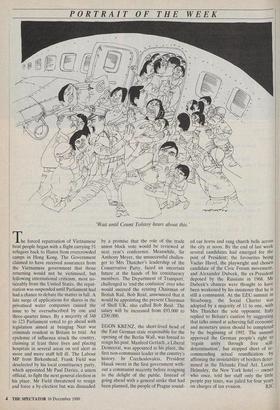PORTRAIT OF THE WEEK
`Wait until Count Tolstoy hears about this.'
he forced repatriation of Vietnamese boat people began with a flight carrying 51 refugees back to Hanoi from overcrowded camps in Hong Kong. The Government claimed to have received assurances from the Vietnamese government that those returning would not be victimised, but following international criticism, most no- ticeably from the United States, the repat- riation was suspended until Parliament had had a chance to debate the matter in full. A late surge of applications for shares in the privatised water companies caused the issue to be oversubscribed by one and three-quarter times. By a majority of 348 to 123 Parliament voted to go ahead with legislation aimed at bringing Nazi war criminals resident in Britain to trial. An epidemic of influenza struck the country, claiming at least three lives and placing hospitals in several areas on red alert as more and more staff fell ill. The Labour MP from Birkenhead, Frank Field was deselected by his local constituency party, which appointed Mr Paul Davies, a union official, to fight the next general election in his place. Mr Field threatened to resign and force a by-election but was dissuaded by a promise that the role of the trade union block vote would be reviewed at next year's conference. Meanwhile, Sir Anthony Meyer, the unsuccessful challen- ger to Mrs Thatcher's leadership of the Conservative Party, faced an uncertain future at the hands of his constituency members. The Department of Transport, challenged to 'end the confusion' over who would succeed the retiring Chairman of British Rail, Bob Reid, announced that it would be appointing the present Chairman of Shell UK, also called Bob Reid. The salary will be increased from £93,000 to f200,000.
EGON KRENZ, the short-lived head of the East German state responsible for the opening of the Berlin Wall, was forced to resign his post. Manfred Gerlach, a Liberal Democrat, was appointed in his place, the first non-communist leader in the country's history. In Czechoslovakia, President Husak swore in the first government with- out a communist majority before resigning to the delight of the public. Instead of going ahead with a general strike that had been planned, the people of Prague sound-
ed car horns and rang church bells across the city at noon. By the end of last week several candidates had emerged for the post of President; the favourites being Vaclav Havel, the playwright and chosen candidate of the Civic Forum movement, and Alexander Dubcek, the ex-President deposed by the Russians in 1968. Mr Dubcek's chances were thought to have been weakened by his insistence that he is still a communist. At the EEC summit in Strasbourg, the Social Charter was adopted by a majority of 11 to one, with Mrs Thatcher the sole opponent. Italy replied to Britain's caution by suggesting that talks aimed at achieving full economic and monetary union should be completed by the beginning of 1992. The summit approved the German people's right to `regain unity through free self- determination', but stopped short of re- commending actual reunification by affirming the inviolability of borders deter- mined in the Helsinki Final Act. Leona Helmsley, the New York hotel — owner who once, told her staff only the little people pay taxes, was jailed for four years on charges of tax evasion. RTC


















































 Previous page
Previous page